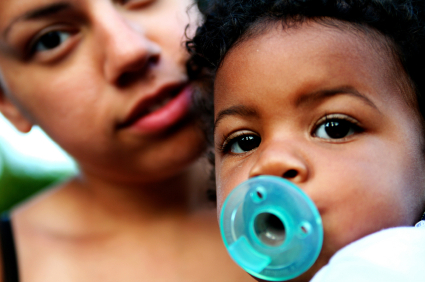Pacifiers
Pacifiers are a source of debate among experts and parents. Supporters of pacifier use claim that they help to soothe a fussy baby when nursing isn’t possible or to comfort a colicky baby. Furthermore, pacifiers can satisfy some babies who need a lot of extra sucking time.
Opponents of pacifiers argue that the use of pacifiers in the first six to eight weeks can cause nipple confusion and subsequently lead to sucking problems. They believe that giving your baby a pacifier may also lead to a habit that will be hard to break, especially if you use it to put your baby to sleep or every time your baby gets upset. Pacifiers have been shown to cause rashes around children’s mouths and sometimes lead to problems with the normal development of teeth.
In order to avoid the possibility of nipple confusion, the best approach to take is to avoid the use of pacifiers until a baby is at least six weeks old or until your milk supply is well established. Choose pacifiers that are made from safe materials such as silicone or natural rubber. Pick pacifiers that are constructed from a single piece rather than those made from multiple parts because the nipples can break off and create a choking hazard. Click here for a list of safer pacifiers.
Teethers
Teething can cause pain and discomfort. Different babies have different levels of pain. However, even a low level of discomfort can frighten your baby. It is easy to reach for a teething gel or Tylenol, but consider some more natural options first.
Simply distracting your baby with a toy or a silly game is often all you need to do. If this doesn’t work, try giving your baby something to chew on to both distract him and to help his gums feel better. A frozen washcloth or frozen banana can be cheap and effective. You can also try freezing a teething ring – there are some safer choices made from silicone or natural rubber (click here for a list).
Or you can try organic, all-natural teething biscuits. If none of these remedies work, consider taking your baby to the doctor to make sure something more serious isn’t causing her pain.

Pacifiers
Pacifiers are a source of debate among experts and parents. Supporters of pacifier use claim that they help to soothe a fussy baby when nursing isn’t possible or to comfort a colicky baby. Furthermore, pacifiers can satisfy some babies who need a lot of extra sucking time.
Opponents of pacifiers argue that the use of pacifiers in the first six to eight weeks can cause nipple confusion and subsequently lead to sucking problems. They believe that giving your baby a pacifier may also lead to a habit that will be hard to break, especially if you use it to put your baby to sleep or every time your baby gets upset. Pacifiers have been shown to cause rashes around children’s mouths and sometimes lead to problems with the normal development of teeth.
In order to avoid the possibility of nipple confusion, the best approach to take is to avoid the use of pacifiers until a baby is at least six weeks old or until your milk supply is well established. Choose pacifiers that are made from safe materials such as silicone or natural rubber. Pick pacifiers that are constructed from a single piece rather than those made from multiple parts because the nipples can break off and create a choking hazard.
Teethers
Teething can cause pain and discomfort. Different babies have different levels of pain. However, even a low level of discomfort can frighten your baby. It is easy to reach for a teething gel or Tylenol, but consider some more natural options first.
Simply distracting your baby with a toy or a silly game is often all you need to do. If this doesn’t work, try giving your baby something to chew on to both distract him and to help his gums feel better. A frozen washcloth or frozen banana can be cheap and effective. You can also try freezing a teething ring – there are some safer choices made from silicone or natural rubber.
Or you can try organic, all-natural teething biscuits. If none of these remedies work, consider taking your baby to the doctor to make sure something more serious isn’t causing her pain.

